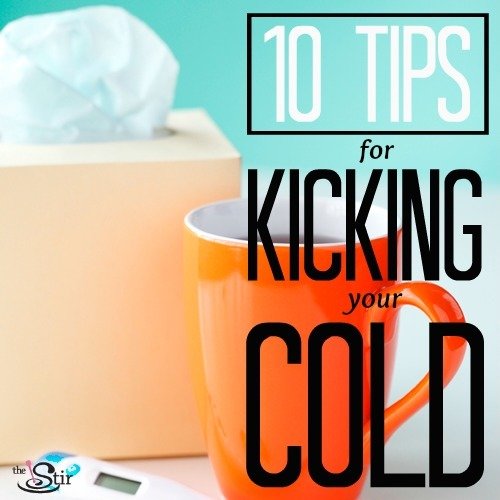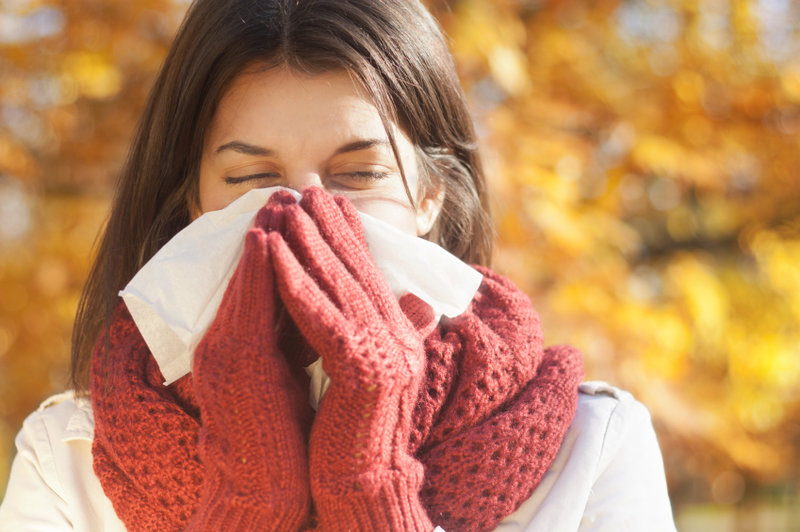The unfortunate fact of the matter is that a cold can last up to a week and symptoms (like congestion) can persist for as many as two weeks! That said, there are certain moves you may be making — even some you may think are helpful! — that are causing your cold to linger. We rounded up 10 of the most common mistakes that prolong a cold.
Check them out below, then tell us: What have you found helps when you have a cold that won’t seem to go away? Images © iStock.com/Thomas_EyeDesign & © iStock.com/amphotora Resting as much as you can within the first few days of a cold is ideal, but it’s never too late to clean up your act by bowing out of certain commitments to take care of yourself. At the same time, you don’t need to sleep for hours on end. “Rest can also mean lying on the sofa or in bed but not sleeping,” says Schmid. “Hydration is essential in providing your body the nutrients necessary to fight both a cold and the thinning mucus that is developing as a result of the virus,” explains Joseph C. Koval, MD, medical director for Clinical Performance at Geisinger-Community Medical Center in Scranton, Pennsylvania. “Water, fruit juices, decaf tea, and even milk can be good for a cold. Despite popular belief, the protein, calories, and fat in milk can help rebuild strength. Try to avoid caffeinated drinks and sugary sodas.” Plus, active ingredients like pseudoephedrine “are designed to suppress the immune system by causing a stress reaction in the body,” says Schmid. “And acetaminophen can be hard on the liver and can exacerbate viral illnesses.” So best to use these products in moderation and check with your doctor if you’ve been relying on them for more than four days. The best way to tell the difference? “Often, colds and flus are accompanied by that classic, tickling sore throat, perhaps a low-grade fever, and aches, just before the congestion appears,” explains Schmid. “Nasal phlegm is generally white to yellow, and symptoms usually resolve in about seven days. However, allergies tend to manifest with sneezing, itchy eyes, and clear nasal discharge, and they appear seasonally or after exposure to certain triggers such as cats, mold, or dairy.” For that reason, stress management (meditation, deep breathing, napping, etc.) is key to finally combating a cold. “High-sugar and refined carbohydrate foods and drinks put a strain on the body, because not only they tend to be lower in the important nutrients that fuel the immune system, such as vitamins A, D & K, and the minerals calcium and magnesium, but they require tens of enzymatic reactions — using the same vitamins and minerals mentioned above — in the body to be converted into energy,” says Schmid. “A diet high in sugar and carbs also creates stress and systemic inflammation in the body.” Thus, Schmid recommends cutting back on these foods and drinks and sticking to healthier fare, like homemade soups and stews, vegetables, and combinations of whole grains like brown rice and quinoa. “Most people know to aim for eight hours of sleep each night, and it’s important to consistently get that amount and maintain a regular sleep schedule,” says Dr. Koval. “Doing so can allow your body to regain the energy it needs to combat the virus.” Instead, Schmid advises seeing an illness as a message that your body would appreciate slowing down a bit. It’s also a reminder that you can “give yourself permission to heal.” “Medical evidence is mixed on whether vitamins C and D shorten the duration or severity of a cold, but it is believed that maintaining adequate levels of these vitamins in general is good for your overall health, including the prevention of cold and respiratory viruses,” notes Dr. Koval. “Elderberry, in its limited scientific experimentation, has shown promise in fighting the common cold and the flu, but the plant in its raw form can be toxic, so always check with a doctor before taking an elderberry supplement or extract.” More from CafeMom: 8 All-Natural Ways to Ward Off the Cold & Flu (PHOTOS) “Symptoms like a fever of more than 100.5 degrees for more than two to three days, painful swallowing, or vomiting should spur a more immediate call to the doctor," he advises.













title: “10 Reasons You Can T Get Rid Of Your Cold” ShowToc: true date: “2024-09-16” author: “Denice Tong”
The unfortunate fact of the matter is that a cold can last up to a week and symptoms (like congestion) can persist for as many as two weeks! That said, there are certain moves you may be making — even some you may think are helpful! — that are causing your cold to linger. We rounded up 10 of the most common mistakes that prolong a cold.
Check them out below, then tell us: What have you found helps when you have a cold that won’t seem to go away? Images © iStock.com/Thomas_EyeDesign & © iStock.com/amphotora Resting as much as you can within the first few days of a cold is ideal, but it’s never too late to clean up your act by bowing out of certain commitments to take care of yourself. At the same time, you don’t need to sleep for hours on end. “Rest can also mean lying on the sofa or in bed but not sleeping,” says Schmid. “Hydration is essential in providing your body the nutrients necessary to fight both a cold and the thinning mucus that is developing as a result of the virus,” explains Joseph C. Koval, MD, medical director for Clinical Performance at Geisinger-Community Medical Center in Scranton, Pennsylvania. “Water, fruit juices, decaf tea, and even milk can be good for a cold. Despite popular belief, the protein, calories, and fat in milk can help rebuild strength. Try to avoid caffeinated drinks and sugary sodas.” Plus, active ingredients like pseudoephedrine “are designed to suppress the immune system by causing a stress reaction in the body,” says Schmid. “And acetaminophen can be hard on the liver and can exacerbate viral illnesses.” So best to use these products in moderation and check with your doctor if you’ve been relying on them for more than four days. The best way to tell the difference? “Often, colds and flus are accompanied by that classic, tickling sore throat, perhaps a low-grade fever, and aches, just before the congestion appears,” explains Schmid. “Nasal phlegm is generally white to yellow, and symptoms usually resolve in about seven days. However, allergies tend to manifest with sneezing, itchy eyes, and clear nasal discharge, and they appear seasonally or after exposure to certain triggers such as cats, mold, or dairy.” For that reason, stress management (meditation, deep breathing, napping, etc.) is key to finally combating a cold. “High-sugar and refined carbohydrate foods and drinks put a strain on the body, because not only they tend to be lower in the important nutrients that fuel the immune system, such as vitamins A, D & K, and the minerals calcium and magnesium, but they require tens of enzymatic reactions — using the same vitamins and minerals mentioned above — in the body to be converted into energy,” says Schmid. “A diet high in sugar and carbs also creates stress and systemic inflammation in the body.” Thus, Schmid recommends cutting back on these foods and drinks and sticking to healthier fare, like homemade soups and stews, vegetables, and combinations of whole grains like brown rice and quinoa. “Most people know to aim for eight hours of sleep each night, and it’s important to consistently get that amount and maintain a regular sleep schedule,” says Dr. Koval. “Doing so can allow your body to regain the energy it needs to combat the virus.” Instead, Schmid advises seeing an illness as a message that your body would appreciate slowing down a bit. It’s also a reminder that you can “give yourself permission to heal.” “Medical evidence is mixed on whether vitamins C and D shorten the duration or severity of a cold, but it is believed that maintaining adequate levels of these vitamins in general is good for your overall health, including the prevention of cold and respiratory viruses,” notes Dr. Koval. “Elderberry, in its limited scientific experimentation, has shown promise in fighting the common cold and the flu, but the plant in its raw form can be toxic, so always check with a doctor before taking an elderberry supplement or extract.” More from CafeMom: 8 All-Natural Ways to Ward Off the Cold & Flu (PHOTOS) “Symptoms like a fever of more than 100.5 degrees for more than two to three days, painful swallowing, or vomiting should spur a more immediate call to the doctor," he advises.













title: “10 Reasons You Can T Get Rid Of Your Cold” ShowToc: true date: “2024-08-30” author: “Jim Biggs”
The unfortunate fact of the matter is that a cold can last up to a week and symptoms (like congestion) can persist for as many as two weeks! That said, there are certain moves you may be making — even some you may think are helpful! — that are causing your cold to linger. We rounded up 10 of the most common mistakes that prolong a cold.
Check them out below, then tell us: What have you found helps when you have a cold that won’t seem to go away? Images © iStock.com/Thomas_EyeDesign & © iStock.com/amphotora Resting as much as you can within the first few days of a cold is ideal, but it’s never too late to clean up your act by bowing out of certain commitments to take care of yourself. At the same time, you don’t need to sleep for hours on end. “Rest can also mean lying on the sofa or in bed but not sleeping,” says Schmid. “Hydration is essential in providing your body the nutrients necessary to fight both a cold and the thinning mucus that is developing as a result of the virus,” explains Joseph C. Koval, MD, medical director for Clinical Performance at Geisinger-Community Medical Center in Scranton, Pennsylvania. “Water, fruit juices, decaf tea, and even milk can be good for a cold. Despite popular belief, the protein, calories, and fat in milk can help rebuild strength. Try to avoid caffeinated drinks and sugary sodas.” Plus, active ingredients like pseudoephedrine “are designed to suppress the immune system by causing a stress reaction in the body,” says Schmid. “And acetaminophen can be hard on the liver and can exacerbate viral illnesses.” So best to use these products in moderation and check with your doctor if you’ve been relying on them for more than four days. The best way to tell the difference? “Often, colds and flus are accompanied by that classic, tickling sore throat, perhaps a low-grade fever, and aches, just before the congestion appears,” explains Schmid. “Nasal phlegm is generally white to yellow, and symptoms usually resolve in about seven days. However, allergies tend to manifest with sneezing, itchy eyes, and clear nasal discharge, and they appear seasonally or after exposure to certain triggers such as cats, mold, or dairy.” For that reason, stress management (meditation, deep breathing, napping, etc.) is key to finally combating a cold. “High-sugar and refined carbohydrate foods and drinks put a strain on the body, because not only they tend to be lower in the important nutrients that fuel the immune system, such as vitamins A, D & K, and the minerals calcium and magnesium, but they require tens of enzymatic reactions — using the same vitamins and minerals mentioned above — in the body to be converted into energy,” says Schmid. “A diet high in sugar and carbs also creates stress and systemic inflammation in the body.” Thus, Schmid recommends cutting back on these foods and drinks and sticking to healthier fare, like homemade soups and stews, vegetables, and combinations of whole grains like brown rice and quinoa. “Most people know to aim for eight hours of sleep each night, and it’s important to consistently get that amount and maintain a regular sleep schedule,” says Dr. Koval. “Doing so can allow your body to regain the energy it needs to combat the virus.” Instead, Schmid advises seeing an illness as a message that your body would appreciate slowing down a bit. It’s also a reminder that you can “give yourself permission to heal.” “Medical evidence is mixed on whether vitamins C and D shorten the duration or severity of a cold, but it is believed that maintaining adequate levels of these vitamins in general is good for your overall health, including the prevention of cold and respiratory viruses,” notes Dr. Koval. “Elderberry, in its limited scientific experimentation, has shown promise in fighting the common cold and the flu, but the plant in its raw form can be toxic, so always check with a doctor before taking an elderberry supplement or extract.” More from CafeMom: 8 All-Natural Ways to Ward Off the Cold & Flu (PHOTOS) “Symptoms like a fever of more than 100.5 degrees for more than two to three days, painful swallowing, or vomiting should spur a more immediate call to the doctor," he advises.













title: “10 Reasons You Can T Get Rid Of Your Cold” ShowToc: true date: “2024-09-07” author: “Patsy Vallien”
The unfortunate fact of the matter is that a cold can last up to a week and symptoms (like congestion) can persist for as many as two weeks! That said, there are certain moves you may be making — even some you may think are helpful! — that are causing your cold to linger. We rounded up 10 of the most common mistakes that prolong a cold.
Check them out below, then tell us: What have you found helps when you have a cold that won’t seem to go away? Images © iStock.com/Thomas_EyeDesign & © iStock.com/amphotora Resting as much as you can within the first few days of a cold is ideal, but it’s never too late to clean up your act by bowing out of certain commitments to take care of yourself. At the same time, you don’t need to sleep for hours on end. “Rest can also mean lying on the sofa or in bed but not sleeping,” says Schmid. “Hydration is essential in providing your body the nutrients necessary to fight both a cold and the thinning mucus that is developing as a result of the virus,” explains Joseph C. Koval, MD, medical director for Clinical Performance at Geisinger-Community Medical Center in Scranton, Pennsylvania. “Water, fruit juices, decaf tea, and even milk can be good for a cold. Despite popular belief, the protein, calories, and fat in milk can help rebuild strength. Try to avoid caffeinated drinks and sugary sodas.” Plus, active ingredients like pseudoephedrine “are designed to suppress the immune system by causing a stress reaction in the body,” says Schmid. “And acetaminophen can be hard on the liver and can exacerbate viral illnesses.” So best to use these products in moderation and check with your doctor if you’ve been relying on them for more than four days. The best way to tell the difference? “Often, colds and flus are accompanied by that classic, tickling sore throat, perhaps a low-grade fever, and aches, just before the congestion appears,” explains Schmid. “Nasal phlegm is generally white to yellow, and symptoms usually resolve in about seven days. However, allergies tend to manifest with sneezing, itchy eyes, and clear nasal discharge, and they appear seasonally or after exposure to certain triggers such as cats, mold, or dairy.” For that reason, stress management (meditation, deep breathing, napping, etc.) is key to finally combating a cold. “High-sugar and refined carbohydrate foods and drinks put a strain on the body, because not only they tend to be lower in the important nutrients that fuel the immune system, such as vitamins A, D & K, and the minerals calcium and magnesium, but they require tens of enzymatic reactions — using the same vitamins and minerals mentioned above — in the body to be converted into energy,” says Schmid. “A diet high in sugar and carbs also creates stress and systemic inflammation in the body.” Thus, Schmid recommends cutting back on these foods and drinks and sticking to healthier fare, like homemade soups and stews, vegetables, and combinations of whole grains like brown rice and quinoa. “Most people know to aim for eight hours of sleep each night, and it’s important to consistently get that amount and maintain a regular sleep schedule,” says Dr. Koval. “Doing so can allow your body to regain the energy it needs to combat the virus.” Instead, Schmid advises seeing an illness as a message that your body would appreciate slowing down a bit. It’s also a reminder that you can “give yourself permission to heal.” “Medical evidence is mixed on whether vitamins C and D shorten the duration or severity of a cold, but it is believed that maintaining adequate levels of these vitamins in general is good for your overall health, including the prevention of cold and respiratory viruses,” notes Dr. Koval. “Elderberry, in its limited scientific experimentation, has shown promise in fighting the common cold and the flu, but the plant in its raw form can be toxic, so always check with a doctor before taking an elderberry supplement or extract.” More from CafeMom: 8 All-Natural Ways to Ward Off the Cold & Flu (PHOTOS) “Symptoms like a fever of more than 100.5 degrees for more than two to three days, painful swallowing, or vomiting should spur a more immediate call to the doctor," he advises.













title: “10 Reasons You Can T Get Rid Of Your Cold” ShowToc: true date: “2024-10-18” author: “Elwood Bowen”
The unfortunate fact of the matter is that a cold can last up to a week and symptoms (like congestion) can persist for as many as two weeks! That said, there are certain moves you may be making — even some you may think are helpful! — that are causing your cold to linger. We rounded up 10 of the most common mistakes that prolong a cold.
Check them out below, then tell us: What have you found helps when you have a cold that won’t seem to go away? Images © iStock.com/Thomas_EyeDesign & © iStock.com/amphotora Resting as much as you can within the first few days of a cold is ideal, but it’s never too late to clean up your act by bowing out of certain commitments to take care of yourself. At the same time, you don’t need to sleep for hours on end. “Rest can also mean lying on the sofa or in bed but not sleeping,” says Schmid. “Hydration is essential in providing your body the nutrients necessary to fight both a cold and the thinning mucus that is developing as a result of the virus,” explains Joseph C. Koval, MD, medical director for Clinical Performance at Geisinger-Community Medical Center in Scranton, Pennsylvania. “Water, fruit juices, decaf tea, and even milk can be good for a cold. Despite popular belief, the protein, calories, and fat in milk can help rebuild strength. Try to avoid caffeinated drinks and sugary sodas.” Plus, active ingredients like pseudoephedrine “are designed to suppress the immune system by causing a stress reaction in the body,” says Schmid. “And acetaminophen can be hard on the liver and can exacerbate viral illnesses.” So best to use these products in moderation and check with your doctor if you’ve been relying on them for more than four days. The best way to tell the difference? “Often, colds and flus are accompanied by that classic, tickling sore throat, perhaps a low-grade fever, and aches, just before the congestion appears,” explains Schmid. “Nasal phlegm is generally white to yellow, and symptoms usually resolve in about seven days. However, allergies tend to manifest with sneezing, itchy eyes, and clear nasal discharge, and they appear seasonally or after exposure to certain triggers such as cats, mold, or dairy.” For that reason, stress management (meditation, deep breathing, napping, etc.) is key to finally combating a cold. “High-sugar and refined carbohydrate foods and drinks put a strain on the body, because not only they tend to be lower in the important nutrients that fuel the immune system, such as vitamins A, D & K, and the minerals calcium and magnesium, but they require tens of enzymatic reactions — using the same vitamins and minerals mentioned above — in the body to be converted into energy,” says Schmid. “A diet high in sugar and carbs also creates stress and systemic inflammation in the body.” Thus, Schmid recommends cutting back on these foods and drinks and sticking to healthier fare, like homemade soups and stews, vegetables, and combinations of whole grains like brown rice and quinoa. “Most people know to aim for eight hours of sleep each night, and it’s important to consistently get that amount and maintain a regular sleep schedule,” says Dr. Koval. “Doing so can allow your body to regain the energy it needs to combat the virus.” Instead, Schmid advises seeing an illness as a message that your body would appreciate slowing down a bit. It’s also a reminder that you can “give yourself permission to heal.” “Medical evidence is mixed on whether vitamins C and D shorten the duration or severity of a cold, but it is believed that maintaining adequate levels of these vitamins in general is good for your overall health, including the prevention of cold and respiratory viruses,” notes Dr. Koval. “Elderberry, in its limited scientific experimentation, has shown promise in fighting the common cold and the flu, but the plant in its raw form can be toxic, so always check with a doctor before taking an elderberry supplement or extract.” More from CafeMom: 8 All-Natural Ways to Ward Off the Cold & Flu (PHOTOS) “Symptoms like a fever of more than 100.5 degrees for more than two to three days, painful swallowing, or vomiting should spur a more immediate call to the doctor," he advises.












